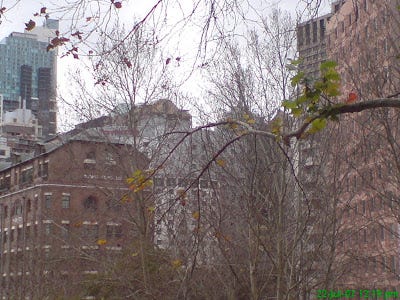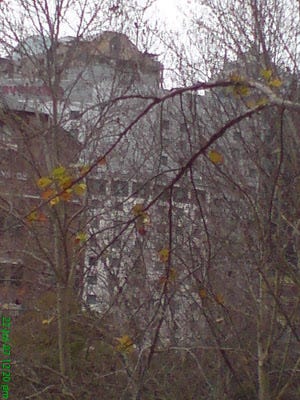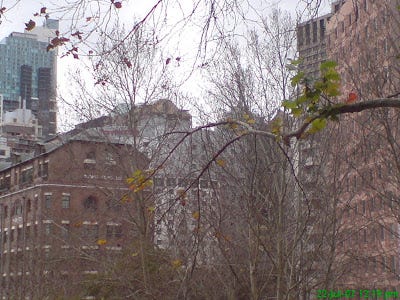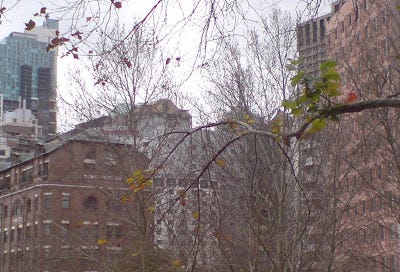*

O Captain! my Captain! our fearful trip is done,
The ship has weather'd every rack,
the prize we sought is won,
The port is near, the bells I hear, the people all exulting,
While follow eyes the steady keel, the vessel grim and daring; But O heart! heart! heart!
O the bleeding drops of red,
Where on the deck my Captain lies, Fallen cold and dead.
O Captain! my Captain! rise up and hear the bells;
Rise up- for you the flag is flung-
for you the bugle trills,
For you bouquets and ribbon'd wreaths- for you the shores a-crowding,
For you they call, the swaying mass, their eager faces turning;
Here Captain! dear father!
This arm beneath your head!
It is some dream that on the deck,
You've fallen cold and dead.
My Captain does not answer, his lips are pale and still,
My father does not feel my arm, he has no pulse nor will,
The ship is anchor'd safe and sound, its voyage closed and done,
From fearful trip the victor ship comes in with object won;
Exult O shores, and ring O bells!
But I with mournful tread,
Walk the deck my Captain lies,
Fallen cold and dead.
Walt Whitman

Feverish, he turned to watch. There were sailors everywhere. Christ was on offer. The streets were crowded now. It was a different city to the one he had once known. He walked past China town; and there was wave after wave of people blocking the footpath. People from everywhere, every part of the world. The Tower of Babel, his mother's warnings, had come true. Perhaps mostly for the better, occasionally for the worse. The bottle shop yawned past. He watched the animated gestures of a drunk, as he always did. There wasn't a single soul he knew. Not one. Even the staff at the shops had changed. The city had become the vast indifference.
Fleas hopped on his bare feet. He pined for a different time, a different life. Yet he was proud of the stability he had created, for himself, for his teenage children. Sam is off to university this year. We're all very proud. There were days of darkness and of angst, but the misery that had seeped through every bone as if it was methadone, that had gone. In crisis? Far from it; the shadows were cheerful now, full of echoes, cut glass glinting in the sun; nausea finding him well at home. The masks had dropped and disappeared. There was nothing to hide any more. The misshapen beast that had been his true self had disappeared.
The story always pushed him up against the edges of strange lives. He followed the circus for three days for a piece for summer reading. The hierarchy was complete. There was the famous Ashton family in their massive air conditioned luxury caravans; there were the young runaways they picked up in country towns, lured by the romance of the circus, ready to work their butt off for a pittance, to sleep in tiny, grimy quarters. And there was the alcoholic dwarf he was drawn to more than any other character; the evil little thing always with a can in his hand, always hitting them up for money.
They bought him a carton of beer in return for his insights; which were bitter and aslant. The elephants, chained, rocked back and forth under the gum trees, in the summer heat, their sad rocking emblematic of a greater sadness, the funeral of us all, the shallow heat, the smell of their cramped quarters. They watched the young acrobats, their lithe bodies beyond anything they could achieve. He was in shadows, he was in darkness, he peered out at these scenes, took notes, tried to form lyrical sentences which would make sense back in the office, back on the slippery deck that was The Sydney Morning Herald.
It had been the proudest day of his life when he started working there, but as the years rolled by other things happened. He destroyed his own reputation. Nice guy, pity he drinks so much. These were the echoes of former times, the nights before he joined the mainstream when electric sparks bowled in great circles through the night, when he sat grinding his teeth and pounding away at the typewriter, when he struggled, determined to make a living by it all, and the cheques took forever to arrive.
The decision to live by the typewriter had been one of the most fateful of his life. The trail of short stories, novellas, novels, grew higher and higher, their unpublished status ever more a lament to his own inadequacies. The little magazines would always take copy, indeed were desperate for it, but paid like dirt. His fingers pounded across the keyboards. So much have I written, to so little end, lurched in and out of his brain. Here in these strange places. Here under the circus top. They stayed in local motels, he and Greg White, the photographer; and went out to the circus each morning. They watched people rising from their own smelly sleep. And they crowed and crowed, the big shots from the city, as they reached down as if towards an ant farm; and examined people's lives.
The last night they got drunk with the alcoholic dwarf, the circus member he understood the most, bitter, defeated, ugly, the alcohol giving them intimacy, something in common, as they recognised each other's failings, weaknesses, the bitter creature that had arisen under the weight of constant intoxication. They recognised each other; the things they had in common, and their brief alliance, their mutual rants against suburbanites and conservatives; these things held them together; as the tigers paced in their tiny cages and the elephants rocked back and forth in excruciating boredom; and the Ashtons went to sleep in their luxury caravan; here under the giant gum trees in the Australian mid-west.
He often wondered what had happened to him, that bitter little dwarf. Had he stayed with the circus he hated so much? Had he stayed as a curiosity for the gawking crowds, one of God's freaks, there to be poked at and examined, ridiculed, stared at by school children? Had the alcohol eaten him away; his already deformed body grown sicker and sicker? Had he died one night in his tiny little alcove, unlamented by virtually everyone? It wasn't right, nothing was right in either of their lives; and the bitter alcoholic dwarf became a character in his brain; a moment of intimacy under the great Australian sky; the smell of the desert in the summer winds, the smell of alcohol seeping through their skins. Or did he find peace, some form of dignity and normality, perhaps even love, in a suburban enclave in one of the towns through which they passed? Although he had talked long and hard through those few nights they spent together of his desire to leave the circus, to no longer be a human curiosity, here in the late 20th century, the chances of that seemed very remote indeed. As remote as his own chances of a happy ending. And that, in the end, was what they held in common; that was why he looked with renewed curiosity, a greater understanding, each time he passed a circus, setting up, pulling down, dissembling on the path. The dwarf was always with him, although perhaps long dead.

THE BIGGER STORY:
http://www.abc.net.au/news/stories/2009/02/28/2504079.htm?section=justin
Manufacturer Pacific Brands may be about to get millions of dollars in Federal Government grants, just days after it axed 1,800 jobs across Australia.
The majority of the job losses are in Victoria, Queensland and New South Wales.
It has been revealed the company might be entitled to a refund for money it has already spent on research and development, and on manufacturing equipment.
The Government is pleading with Pacific Brands to keep as many jobs in Australia as possible.
The Maritime Union has welcomed news of talks between clothing company Pacific Brands and the Textiles Union.
It is also urging the company to do the right thing by taxpayers, the government and the workers.
The Maritime Union says if the company does not make the effort to keep the jobs here, it will make sure that none of the tax-payer subsidised manufacturing equipment will leave Australia.
http://www.news.com.au/heraldsun/story/0,21985,25118935-661,00.html
February 28, 2009 03:35pm
At least 37 people are still missing three weeks after the Black Saturday bushfires which killed 210 people, an Australian Army chief said today.
Brigadier Michael Arnold, commander of the Joint Task Force assisting Victorian authorities in the fire relief effort, said new teams of soldiers would begin searching devastated properties previously combed for outstanding disaster victims.
Ninety army reservists flew into Melbourne today to join existing soldiers on the ground around the Kinglake area in double-checking ruined homes.
Last week, Victorian Coroner Jennifer Coate ordered virtually all bushfire-ravaged sites to be closely searched again after several sets of human remains were recovered from sites already searched.
"This is a search task requested of us by the police. The coroner wanted to be convinced that a reasonable search had been conducted,'' Brig Arnold said.
"To do that, the police, with us, will go right through the 1300 or so sites that were affected by the fire to confirm that there are no more human remains.
"It's not an easy task. We know that there are 37 missing persons still, the odds are we will come across human remains during this search.''
The death toll from February 7 is already the worst of any bushfire disasters in Australia's history.
http://www.google.com/hostednews/ap/article/ALeqM5jWHK1_e5aHDizUpee0x6O-h7TiTwD96KNROO0
DHAKA, Bangladesh (AP) — Bangladesh's military said 72 officers were still missing Saturday after a two-day mutiny by border guards in which at least 76 people died. The government pledged a full investigation as it swiftly moved to restore confidence and reassert control.
Firefighters were still searching shallow graves and sewers at the border guards' headquarters in the capital, Dhaka, where the bodies of senior officers were hurriedly dumped by the mutineers. Workers also scoured nearby areas, including a pond, in an intense search for more victims.
Among the dead was Maj. Gen. Shakil Ahmed, commander of the Bangladesh Rifles border force, and a woman that authorities believed was his wife.
Army spokesman Brig. Gen. Mahmud Hossain said at least 33 officers survived the carnage but 72 were still unaccounted for.
"This barbaric incident has caused much anger among the soldiers, which will be quelled by a thorough investigation, a trial of the killers and their proper punishment," Hossain told reporters.
The insurrection apparently erupted over the guards' long-standing complaints that their pay hasn't kept pace with soldiers in the army — anger aggravated by the rise in food prices that has accompanied the global economic crisis. The guards earn about $100 a month.
Prime Minister Sheikh Hasina, who took office in January, sought to act decisively and quash questions about stability in the poor South Asian nation during the first major challenge her administration has faced.
Hasina ended the revolt in two days, earning high marks for preventing further bloodshed, by persuading the guards to surrender Thursday with promises of amnesty coupled with threats of military force.




